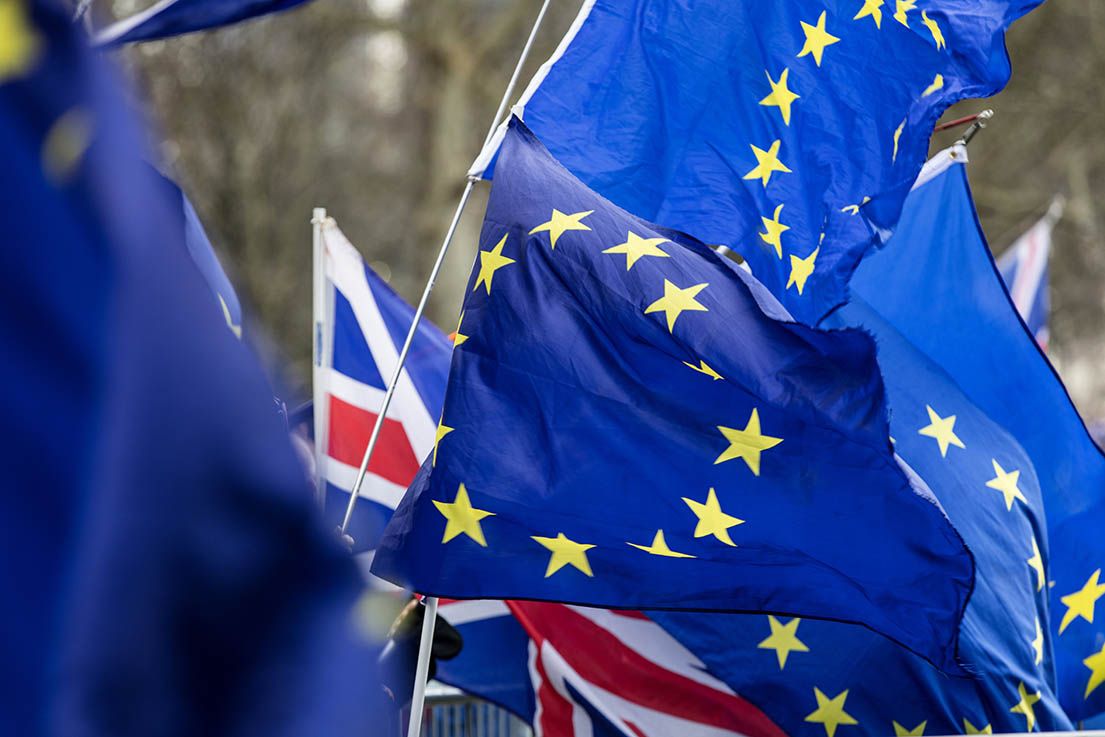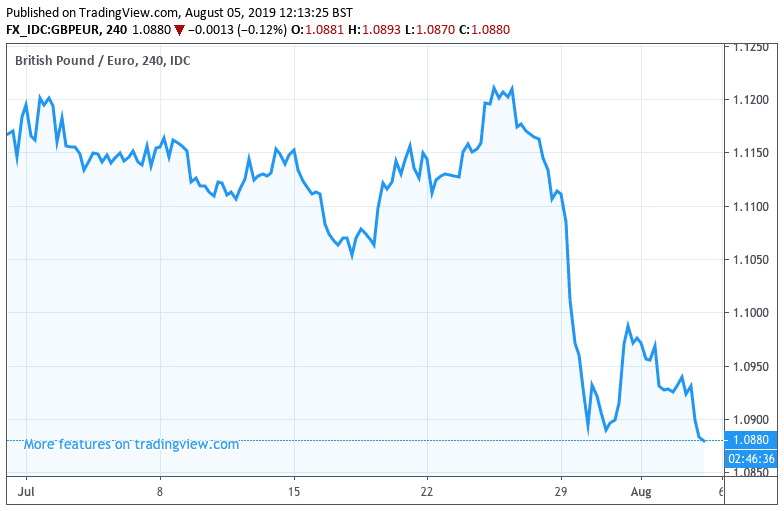British Pound / Euro Rate in Fresh Dip below 1.09, EU and UK Officials Yet to Budge on 'Red Lines'

Image © Adobe Images
- GBP/EUR in fresh impulse lower
- German and UK govt. confirm red lines are stuck fast
- BofAML say GBP/USD more at risk than GBP/EUR in 'no deal' Brexit
The Pound-to-Euro exchange rate fell below the 1.09 marker on Monday, as the UK currency looked set to print fresh two-year lows against its European counterpart.
The exchange rate recorded a low of 1.0871 on Monday, and according to data from TradingView this is the exact same low printed last Friday.
The fresh declines suggest market participants remain eager to reduce exposure to Sterling amidst the ongoing political uncertainty gripping the UK.
Furthermore, it must be noted that global stock markets are under pressure today owing to an escalation in U.S.-China trade tensions and currencies that are deemed to be safe are benefiting.
The Pound sits below the Euro on the 'safe haven' ladder, and this is adding to the downside pressures in GBP/EUR we believe.
Brexit developments on Monday remain distinctively unsupportive of Sterling.
Newswires are quoting a German government spokesperson who has said the EU remains open to negotiating the political declaration struck between the EU and Theresa May's administration.
However, the deal itself remains off limits.
According to Reuters, the spokesperson reiterated a well-used line that the offer "on the table is the best deal possible".
A spokesperson for the UK Prime Minister has meanwhile said the Government remains committed to an October 31 Brexit, "no ifs, no buts."
The spokesperson told assembled media that it is the UK Government's position that a new deal must be struck between the EU and UK, and that it is hoped that the EU changes its position on the Northern Irish backstop.
In short, positions remain entrenched at the start of the new week, and a summer of attrition awaits.
"The 1.9% depreciation of Sterling versus the Euro, and 2.4% drop versus the U.S. Dollar, since 22 July – the day before Johnson became PM – reflects the markets’ increased worries about a hard Brexit on 31 October. The drop partly reflects the market’s belief that a hard Brexit would be an act of economic vandalism that could tip the UK into a recession and lower the UK’s long-run growth potential," adds Kallum Pickering, an economist with Berenberg Bank in London.
We suspect the EU will hold the line betting that the UK Government will fall, and that a new General Election will see a new pro-EU coalition take control as the Brexit Party and Conservative Party cannibalise the Leave vote.
This makes for a tense few weeks and months to come, conditions that are hard supportive for Sterling.
"My strongest view remains that GBP has further to fall in order to catch up with recent political developments. The consensus view, I believe, has always been that ultimately a soft Brexit deal would be negotiated or better still a 2nd referendum would avert. The odds on this have shifted markedly in the past days and weeks and despite recent weakness I suspect the GBP needs to fall further," says Jonathan Pierce, on the sales and trading desk at Credit Suisse.
Time to move your money? Get 3-5% more currency than your bank would offer by using the services of foreign exchange specialists at RationalFX. A specialist broker can deliver you an exchange rate closer to the real market rate, thereby saving you substantial quantities of currency. Find out more here. * Advertisement
Pound more Vulnerable to Dollar than Euro in 'No Deal' Brexit
GBP/USD is likely to get hit more than GBP/EUR under a ‘no deal’ scenario says Thanos Vamvakidis, head of G10 FX strategy at Bank of America Merill Lynch (BofAML).
The analyst says the Euro could itself take a pounding, suggesting the potential for gains against a wounded Sterling is minimised.
“The Euro is underestimating the potential implications on the European economy if there is a no-deal Brexit,” says Vamavakidis.
Instead he sees GBP/USD (Cable) as the pair subject to the most volatility as seen by its greater reaction to recent headlines.
“Cable has reacted much better to the news so it is a better cross to position for Brexit risk. We actually like volatility in Cable, we are long 6-month volatility, because it will be subject to all these headlines,” adds the strategist.
In the case of a no-deal Brexit Vamvakidis expects a decline down to 1.1000 for GBP/USD.
Positioning data, which shows the balance of bullish and bearish bets on a currency, is also relatively neutral suggesting there is room for more short positions in the Pound.
Positioning shows the number of bearish bets against Sterling in the futures market and if it reaches an extreme the risks grow that the exchange rate will snap-back and start rising, however, that isn't the case now.
Even if there is a deal, it could be a long, bumpy ride to get one, taking a considerable toll on the Pound.
“Even if eventually you have a deal, things could get worse before getting better, so we are seeing a game of chicken with neither side wanting to blink first. From this perspective the risks remain to the downside,” says the strategist.
Another pair which could be sensitive to Brexit risk is EUR/USD due to the fact the Euro has not really priced in risk sufficiently.
“Shorting Euro-Dollar on Brexit risks is another way to position for that. Many analysts are just focusing on the share of trade and arguing the impact on the UK will be worse because of that, however, the Eurozone economy has been weakening,” says Vamvakidis in an interview with Bloomberg News.
The country’s most at risk from a 'no deal' are where the data has been worsening the most, such as Germany.
The Pound could have an advantage over the Euro in the case of a 'no deal' Brexit because the Bank of England has more scope for easing policy to help offset the damage to the economy.
The BoE has more ‘ammunition’ due to the fact interest rates are higher, at 0.75% and so could be cut back more than the European Central Bank (ECB) which has interest rates at 0.0%.
The ECB would, therefore, have difficulty in reducing rates any further into negative territory without harming their already battle-weary banking system as banks tend to lose profitability when interest rates fall since they are unable to charge as much interest on loaning money, which is their core occupation.
“At the end of the day with the UK we can see the BoE easing, we can see fiscal support. The room for macroeconomic monetary support in the Eurozone is much more limited,” says Vamvakidis.
Time to move your money? Get 3-5% more currency than your bank would offer by using the services of foreign exchange specialists at RationalFX. A specialist broker can deliver you an exchange rate closer to the real market rate, thereby saving you substantial quantities of currency. Find out more here. * Advertisement

